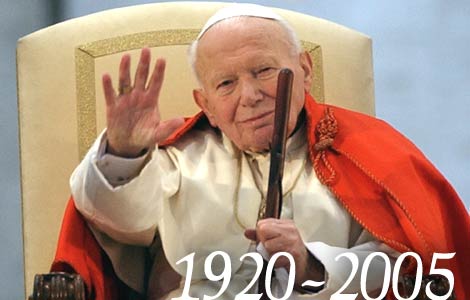
Pope John Paul II, April 10, 2003. (AP Photo/Massimo Sambucetti)
Author’s Note: Some caveats before I begin. I am not a Roman Catholic and I am very skeptical of the whole concept of sainthood, the miracles in support of beatification, and papal infallibility.
April 30, 2011
The beatification of the late Polish-born Pope John Paul II will be this Sunday. When I think of the late John Paul II, I remember his tepid response to child abuse by priests, showing more concern with the effect the scandal was having on the church rather than the effect on the children. Sure priests betrayed their vows, but he showed little concern about betrayals of trust that a child has for their priest.
And remember the 1997 letter from the Vatican warning Ireland’s Catholic bishops not to report all child-abuse cases to the police. Many have described the letter as the “smoking gun” showing that the church enforced a worldwide culture of covering up crimes by pedophile priests. The letter was signed by the late Archbishop Luciano Storero, Pope John Paul II’s diplomat to Ireland.
I also remember Sinead O’Connor on Saturday Night Live when she tore a photo of Pope John Paul II . And her March 2010 open letter to Pope Benedict criticizing the Catholic Church’s role in, and initial coverup of, the child abuse in Ireland.
There are about ten-thousand Roman Catholic Saints. How does one become a Roman Catholic saint? Canonization, the process the Roman Catholic Church uses to name a saint, has only been used since the tenth century. For hundreds of years, starting with the first martyrs of the early Church, saints were chosen by public acclaim, which seems a more democratic way to recognize saints. Gradually, the bishops and finally the Vatican took over authority for approving saints.
In 1983, Pope John Paul II made sweeping changes in the canonization procedure. The process begins at least five years after the death of a Catholic whom people regard as holy. Usually the local bishop investigates the candidate’s life and writings for heroic virtue (or martyrdom) and orthodoxy of doctrine. Then a panel of theologians at the Vatican evaluates the candidate. After approval by the panel and cardinals of the Congregation for the Causes of Saints, the pope proclaims the candidate “venerable.”
The next step, beatification, requires evidence of one miracle (except in the case of martyrs). Since miracles are considered proof that the person is in heaven and can intercede for us, the miracle must take place after the candidate’s death and as a result of a specific petition to the candidate. (Pity the poor protestants who have no saints to intercede for them.) Pope John Paul’s miracle concerns a 49-year-old French nun, Sister Marie Simon-Pierre, who was diagnosed with an aggressive form of Parkinson’s disease in 2001 and whose order prayed to John Paul II after his death in 2005 for help. Didn’t members of the order pray for her before John Paul’s death? Who is to say that the prayer to John Paul II was the one heard by God and not the earlier, more direct ones?
As mentioned above, ordinarily permission to open an investigation is given five years after the death of the person being investigated. By rushing through the beatification of Pope John Paul II, his predecessor and friend, Pope Benedict has shown how silly the whole idea and process of ‘making saints’ is. The beatification of John Paul II makes the Church seem more and more like a good old boys’ club where connections and privilege count.


 The Hunger Site
The Hunger Site
May 2, 2011 at 1:23 pm
It’s all rubbish!! A man who cares not for abused children becoming a saint? If I didn’t think Catholic sainthood was rubbish before, this cinched it! (But I have thought it was rubbish for years!)